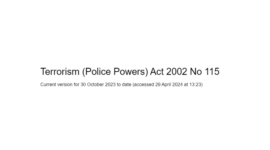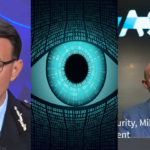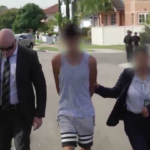The NSW Police Powers Unlocked by the Commissioner’s Terrorism Designation

A panic over terrorism has hit New South Wales, following a recent mass murder and another nonfatal stabbing incident in this state.
NSW police commissioner Karen Webb determined that the nonlethal knife crime was an act of terrorism under the law, yet the likely targeted multiple killing of women in Bondi didn’t trigger any such classification.
Issues raised by the designation of a 16-year-old Muslim offender as a terrorist, while a white Australian killer of 40 was considered merely a criminal, relate to whether our criminal justice system results in prejudicial treatment of those citizens and residents that follow the faith of Islam.
And as well, it triggered questions around whether a killing motivated by religious sensibilities is always a terrorist act, while the targeted killing of women continues to simply remain a crime.
Webb announced that she’d determined the 15 April 2024 stabbing in a church in Wakeley was a terrorist act at 1.35 am that same evening, while NSW premier Chris Minns told the ABC the next night that the decision had unlocked special powers to then ascertain whether the crime was indeed a terrorism offence.
These special powers were enacted by the Carr government in December 2022, in direct response to the 2001 9/11 attacks in New York, and the October 2022 Bali bombings, which killed 88 Australians, with then NSW premier Bob Carr stating the latter “brought terrorism to our doorstep”.
And these significantly more invasive inquiry powers that NSW bestows upon the NSW Police Force when it comes to an incident thought to be terrorist in nature, are held within the Terrorism (Police Powers) Act 2002 (NSW) (the Act), which has been beefed-up significantly along the way.
Accountability essential
The Act provides a definition for a terrorist act under section 3, and it follows that of Commonwealth law.
A terrorist act is a serious violent or harmful crime to property or person/s, which is supposed to advance “a political, religious or ideological cause”, via the coercion or intimidation of a domestic or foreign government or the general public or a part of any of these entities.
Carr opened his second reading speech on the legislation explaining that these powers weren’t being provided carte blanche to state law enforcement, but rather they would be triggered by a specific set of circumstances for a set period of time, prior to being automatically lifted.
The Labor premier explained that the new powers are triggered if the police commissioner or a deputy is satisfied that there are reasonable grounds for the powers to be used to assist in preventing an imminent terror threat or immediately after a terrorist act.
Section 11 of the Terrorism Bill provides the timeframes that investigative detention powers are active for.
In the case of preventing a terrorist act within the next 14 days, the powers apply for 7 days and can be extended to 14, while, in relation to an actual act, the limit is 24 hours that can extend to 48.
And the main powers this legislation provides police officers are enhanced versions of their regular powers, via a lowering of the bar in terms of how and when they can be applied, as well as a set of investigative and preventive detention powers and a system of covert warrants.
Detaining to investigate and prevent
Once the terror authorisation has been applied, officers can require a “target” of the designation to identify themselves or face up to 2 years in prison, and it further permits the warrantless searching of the target, any-related premises and their vehicle, as well as to seize any items.
Part 2 division 2AA contains investigative detention powers, which were a 2016 Baird government addition to the Act.
And NSW Premier Mike Baird explained that the threat of terror was troubling not just for NSW, but the entire globe and, therefore, officers were in need of adequate investigative powers.
Investigative detention is not for the purpose of charging a suspect, however, rather it’s to garner information to prevent or inquire into a terrorist act. And during this period, a detained person’s contact with legal representatives or family is monitored, and it can even be completely denied.
The powers bestowed to officers generally allow for a four-hour period to detain and question an individual without a warrant initially. But the enhanced law further provides police with the power to extend this to up 14 days, due to the “complex investigation techniques” that might be applied.
A justice of the NSW Supreme Court can authorise an investigative detention warrant, which then allows for suspects as young as 14 to be held for up to 14 days and questioned for up to 8 hours continuously within a 24 period.
And the Iemma government inserted part 2A into the Act, via the Terrorism (Police Powers) Amendment (Preventative Detention) Bill 2005, which provides for preventative detention orders with the aim of preventing an imminent terrorist act or to preserve evidence of one.
A Supreme Court judge can issue a preventative detention order, in relation to a suspect as young as 16, who can then be detained for a long as 14 days. And such an order can specify prohibitions on who the detainee can contact, which can result in no contact whatsoever with the outside world.
Searching properties without notice
One of the last acts of the Carr government was to enact the Terrorism Legislation Amendment (Warrants) Bill 2005, which established a system of covert warrants that apply following a terror designation, under part 3 of the Act.
These warrants are so invasive that a search can be conducted without notification of the subject of the warrant or the owner of the premises, in order to prevent a prospective terror attack or to investigate one that has occurred.
These extraordinary policing powers also permit NSW police officers to enter the property that is to be searched via an adjoining premises, and the owner of that property doesn’t have to be notified either, while officers can also impersonate someone to facilitate such a search.
“Those safeguards are an attempt to balance the legitimate needs of law enforcement and the right of privacy that all citizens enjoy,” explained then NSW attorney general Bob Debus, on tabling the covert warrants framework in parliament.
But the issue that’s now revealing itself in this state, and not for the first time, is that although the laws within the Act are colourblind, they seem to have been, for the most part, applied in response to crime relating to Muslim citizens and residents, and some claim this reveals policing bias.







